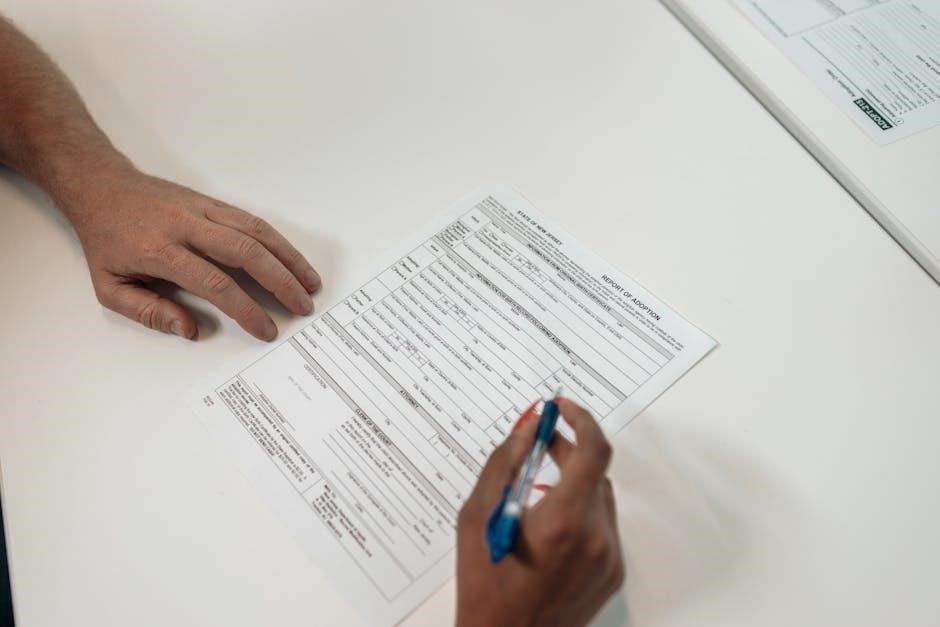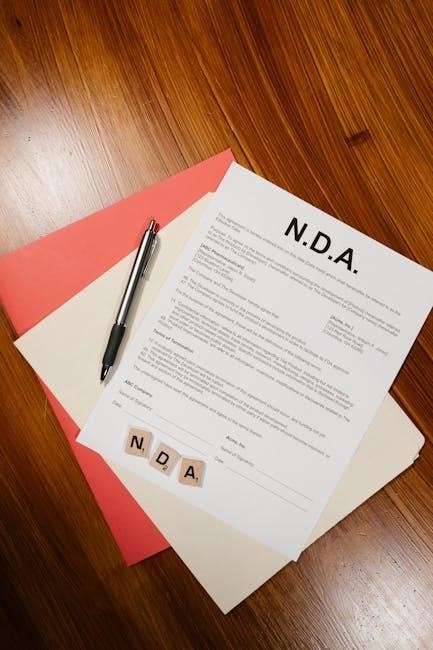A real estate confidentiality agreement ensures the protection of sensitive information shared during property transactions, maintaining privacy and fostering trust between landlords, tenants, buyers, and agents. PDF templates simplify the process, providing a secure and legally binding framework for all parties involved.
1.1 Importance of Confidentiality in Real Estate Transactions
Confidentiality is crucial in real estate transactions to protect sensitive information, such as property details, financial data, and negotiation terms. It ensures privacy for all parties, fostering trust and preventing unauthorized disclosure. PDF templates of real estate confidentiality agreements provide a structured way to maintain this privacy, safeguarding both sellers and buyers from potential misuse of shared information during negotiations or inspections.
1.2 Purpose of a Real Estate Confidentiality Agreement
A real estate confidentiality agreement is designed to protect sensitive information shared between parties during property transactions. Its primary purpose is to ensure that confidential details, such as financial data or property specifics, are used solely for evaluating the opportunity and not disclosed to third parties. This agreement fosters trust and security, allowing negotiations to proceed smoothly while safeguarding both sellers and buyers.

Key Components of a Real Estate Confidentiality Agreement
A real estate confidentiality agreement outlines essential elements to ensure clarity and mutual understanding, protecting sensitive information and defining the scope of the relationship between all parties involved.
2.1 Definition of Confidential Information
Confidential information in a real estate agreement includes sensitive details about the property, financial data, and proprietary information shared between parties. It excludes publicly available information or data required by law. This definition ensures clarity on what must remain private, protecting both landlords and tenants from unauthorized disclosure of their sensitive materials during negotiations or transactions.
2.2 Parties Involved (Seller/Landlord, Buyer/Tenant, Agent)
A real estate confidentiality agreement typically involves the seller/landlord, buyer/tenant, and agent. Each party has specific roles and responsibilities, ensuring that all shared information remains private. The agreement outlines the obligations of each party, creating a secure environment for negotiations. This ensures that sensitive details are protected from unauthorized disclosure and maintains trust.
2.3 Scope of the Agreement
The scope outlines the specific confidential information covered and the duration of its protection. It typically lasts 90 days after the transaction closes or becomes public. The agreement ensures that all shared details, like property inspections and financial terms, remain private unless legally required. This balanced approach protects sensitive data while allowing necessary disclosures, maintaining fairness for all parties involved.

The Purpose of the Agreement
The purpose of a real estate confidentiality agreement is to protect sensitive information, facilitate open communication, and ensure privacy for all parties involved in the transaction.
3.1 Protecting Sensitive Information
Protecting sensitive information is crucial in real estate transactions to safeguard confidential details like property valuations, financial terms, and personal data. A confidentiality agreement ensures that all parties involved handle such information discreetly, preventing unauthorized disclosure. This protection is especially vital for landlords and sellers who share private details about their property. Breaching this obligation can lead to legal consequences, emphasizing the importance of adherence to the agreement’s terms. PDF templates provide a structured way to outline these protections clearly.
3.2 Facilitating Open Communication
A real estate confidentiality agreement fosters open communication by creating a secure environment where sensitive information can be shared without fear of misuse. This trust encourages all parties to collaborate openly, ensuring a smooth transaction process. By establishing clear boundaries, the agreement promotes transparency while protecting confidential data, allowing buyers, sellers, and agents to negotiate effectively. PDF templates often include clauses that emphasize this balance between privacy and collaboration.
3.3 Ensuring Privacy for All Parties
A real estate confidentiality agreement is designed to safeguard the privacy of all parties involved in a transaction. By legally binding signatories to maintain secrecy, it protects sensitive information from unauthorized disclosure. This ensures that landlords, tenants, buyers, and agents can share details without risking exposure, fostering a secure environment for negotiations. PDF templates often outline specific privacy protections, reinforcing trust and compliance among all stakeholders involved in the process.
Benefits of Using a Real Estate Confidentiality Agreement
A real estate confidentiality agreement protects sensitive information, ensuring trust and legal security for all parties involved, while safeguarding both buyer and seller interests effectively.
4.1 Protection for Sellers/Landlords
A real estate confidentiality agreement ensures sellers and landlords can share sensitive property details without risking unauthorized disclosure. It protects their privacy and maintains control over their property’s information, safeguarding against potential misuse or exposure to competitors. This legal framework allows them to negotiate securely, knowing their interests are shielded throughout the transaction process.
4.2 Assurance for Buyers/Tenants
A real estate confidentiality agreement provides buyers and tenants with assurance that they can access necessary property information while protecting their interests. It ensures transparency and builds trust, allowing them to evaluate the property thoroughly. This agreement also guarantees that their confidential discussions and negotiations remain private, facilitating a smooth and secure transaction process for all parties involved.

Term and Termination of the Agreement
The agreement specifies the duration of confidentiality and conditions for termination, ensuring obligations persist beyond the agreement’s end, as detailed in the real estate confidentiality agreement PDF.
5.1 Duration of Confidentiality
The duration of confidentiality typically lasts 90 days from the transaction’s closing, whether successful or not, or until the information becomes publicly available. Obligations survive termination, ensuring continued protection of sensitive data as outlined in the real estate confidentiality agreement PDF.
5.2 Conditions for Termination
The agreement terminates upon the consummation of a purchase, lease, or investment transaction, or if confidential information becomes publicly available. Termination may also occur by mutual agreement or if the transaction is unsuccessful. Obligations to protect confidential information survive termination, ensuring ongoing privacy and security as detailed in the real estate confidentiality agreement PDF.

Confidentiality Obligations
Confidentiality obligations ensure that all parties handle sensitive information responsibly, maintaining privacy and security throughout the real estate transaction process as outlined in the agreement.
6.1 What Constitutes Confidential Information
Confidential information in real estate agreements includes property valuations, financial details, lease terms, and any sensitive data shared between parties. Examples are property inspections, tenant information, and business operations related to the property, as outlined in the agreement to ensure privacy and security.
6.2 How Information Should Be Handled
Confidential information must be handled with care to prevent unauthorized disclosure. Parties should limit access to trusted individuals, use secure methods for sharing, and avoid discussing sensitive details in public settings. Proper storage and disposal of documents are essential to maintain confidentiality throughout the transaction process.
Exclusions from Confidentiality
Confidentiality does not apply to information that is publicly available or required by law to be disclosed. Exceptions ensure compliance with legal obligations while protecting sensitive data.
7.1 Publicly Available Information
Confidentiality agreements exclude information that is publicly available or can be accessed through public records. This includes property details, tax assessments, or zoning laws. Such exclusions ensure the agreement remains practical, as it does not restrict information already in the public domain. Publicly available information is not subject to confidentiality obligations, maintaining a balance between privacy and accessibility of non-sensitive data.
7.2 Information Required by Law
If the law requires disclosure of confidential information, the agreement does not apply. For example, court orders or regulatory compliance may mandate the sharing of certain details. In such cases, the party must disclose the information as legally required, but they should notify the other party beforehand. The agreement does not override legal obligations, ensuring compliance with applicable laws and regulations while maintaining confidentiality where possible. This balance protects both legal requirements and privacy interests.
Consequences of Breach
Breaching a real estate confidentiality agreement can lead to legal actions, including lawsuits for damages, injunctions to halt further disclosure, and potential financial penalties. The party in breach may face reputational damage and loss of business relationships. They might also be required to return or destroy confidential materials. Legal consequences vary based on the agreement’s terms and applicable laws, emphasizing the importance of compliance to avoid severe repercussions.

8.1 Legal Remedies for Breach
Breach of a real estate confidentiality agreement may result in legal action, including injunctions to prevent further unauthorized disclosure. The injured party can seek monetary damages for losses incurred due to the breach. Courts may also order specific performance to enforce the agreement’s terms. Legal remedies aim to restore the injured party to their pre-breach position and deter future violations, ensuring accountability for maintaining confidentiality obligations.
8.2 Financial Penalties
Financial penalties for breaching a real estate confidentiality agreement can include liquidated damages or actual losses. These penalties are often stipulated in the agreement to deter violations. In some cases, the breaching party may be liable for attorney’s fees and costs incurred by the injured party. Such financial repercussions emphasize the importance of adhering to the agreement’s terms to avoid economic consequences and maintain trust in real estate transactions.

How to Create a Real Estate Confidentiality Agreement
Creating a real estate confidentiality agreement involves using templates or online tools like Jotform to draft and customize clauses, ensuring essential elements are included for legal validity.
9.1 Steps to Draft the Agreement
To draft a real estate confidentiality agreement, start by identifying the parties involved and defining the purpose. Use a template or online tools like Jotform to streamline the process. Include clauses for confidential information, exclusions, and termination terms. Ensure the agreement is customized to the specific transaction and reviewed by a legal professional to guarantee compliance and enforceability.
9.2 Essential Clauses to Include
Key clauses in a real estate confidentiality agreement include the definition of confidential information, the scope of the agreement, and the duration of confidentiality. Also, outline exclusions, such as publicly available information, and specify the consequences of breach. Ensure the agreement is clear on the parties’ obligations and include a termination clause to establish when and how the agreement ends. Legal review is recommended for compliance and enforceability.
A real estate confidentiality agreement is vital for safeguarding sensitive information and ensuring smooth transactions. Using a PDF template ensures compliance and protects all parties’ interests effectively. Proper execution and adherence to the agreement foster trust and accountability, making it an indispensable tool in modern real estate dealings.
10.1 Summary of Key Points
- A real estate confidentiality agreement protects sensitive information shared during transactions, ensuring privacy and trust.
- Parties include sellers, buyers, landlords, tenants, and agents, with clear obligations to maintain confidentiality.
- The agreement typically lasts 90 days post-transaction, with exceptions for publicly available or legally required disclosures.
- Templates, like PDF formats, simplify creation and ensure legal compliance.
- Breaches can lead to legal action and financial penalties, emphasizing the importance of adherence.
10.2 Final Thoughts on the Importance of Confidentiality Agreements
Real estate confidentiality agreements are essential for safeguarding sensitive information and fostering trust in transactions. They ensure that all parties, including sellers, buyers, and agents, maintain privacy and adhere to legal standards. By preventing unauthorized disclosure, these agreements protect reputations and financial interests, making them a cornerstone of ethical and secure real estate dealings.

